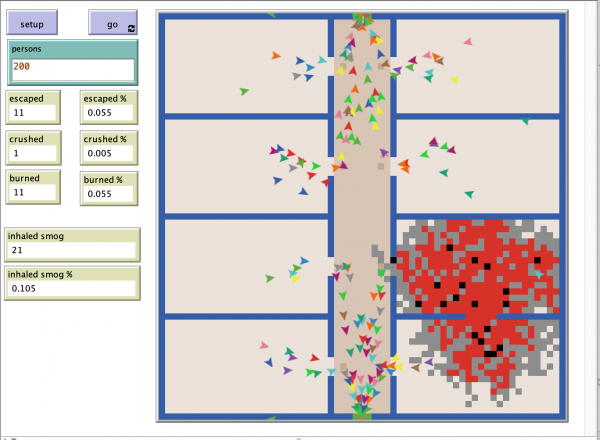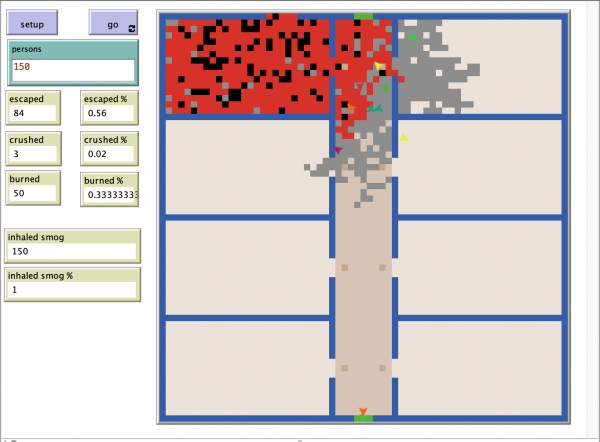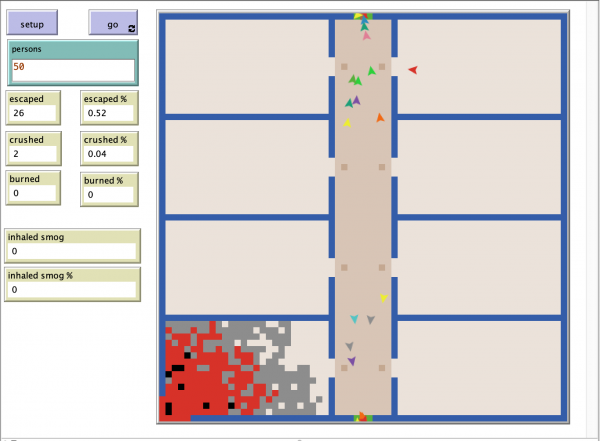Difference between revisions of "Evacuation from burning building"
(Created page with " == Evacuation from burning building simulation ==") |
(→Download) |
||
| (17 intermediate revisions by the same user not shown) | |||
| Line 1: | Line 1: | ||
| − | == | + | == Intro == |
| + | This model simulates evacuation process in case of fire. The purpose of this simulation is to find out how many people can make it out safely in case of fire. | ||
| + | |||
| + | In this building are 8 offices located along the corridor. Walls are shown in blue colour and people can not pass through them. The fire cant pass through them either, however if a fire starts in the wall, it may affect two rooms at once. There are two exits, coloured green at each end of corridor. | ||
| + | |||
| + | '''Software''' | ||
| + | |||
| + | Simulation is created using Netlogo 6.0.2. | ||
| + | |||
| + | |||
| + | == How to use == | ||
| + | |||
| + | At first you need to input the number of people you would like to have in this simulation. This simulation can be started with a button '''setup'''. Make sure the button '''go''' is also clicked. | ||
| + | |||
| + | == Monitors == | ||
| + | |||
| + | '''escaped''' and '''escaped %''' | ||
| + | |||
| + | number of people that successfully escaped the building; absolute or relative number. Person escapes when he makes it to the building exit. Building exit is colored green in this simulation. | ||
| + | |||
| + | '''crushed''' and '''crushed %''' | ||
| + | |||
| + | number of people that have been crushed during evacuation; absolute or relative number. When there are more than 6 people close-by, some of them may be crushed by the others. | ||
| + | |||
| + | '''burned''' and '''burned %''' | ||
| + | |||
| + | number of people that had failed to escape from the building and were burned from the fire; absolute or relative number. Person burns when it presents itself to the fire. | ||
| + | |||
| + | |||
| + | |||
| + | The total of those three monitors must be equal to the number of people in simulation. | ||
| + | |||
| + | |||
| + | |||
| + | '''inhaled smog''' and '''inhaled smog %''' | ||
| + | |||
| + | number of people that inhaled smog. Smog inhalation doesn't mean death, it alerts people of the incoming fire. After smoke inhalation the person becomes disoriented. | ||
| + | |||
| + | |||
| + | |||
| + | == Results == | ||
| + | Based on 100 runs for every number of people, the average results are: | ||
| + | |||
| + | |||
| + | '''number of people: 20''' | ||
| + | escaped: 18 | ||
| + | crushed: 0 | ||
| + | burned: 2 | ||
| + | inhaled smog: 20 | ||
| + | |||
| + | |||
| + | '''number of people: 50''' | ||
| + | escaped: 40 | ||
| + | crushed: 0 | ||
| + | burned: 10 | ||
| + | inhaled smog: 11 | ||
| + | |||
| + | |||
| + | '''number of people: 100''' | ||
| + | escaped: 58 | ||
| + | crushed: 1 | ||
| + | burned: 41 | ||
| + | inhaled smog: 100 | ||
| + | |||
| + | |||
| + | '''number of people: 150''' | ||
| + | escaped: 65 | ||
| + | crushed: 5 | ||
| + | burned: 80 | ||
| + | inhaled smog: 150 | ||
| + | |||
| + | |||
| + | '''number of people: 200''' | ||
| + | escaped: 158 | ||
| + | crushed: 12 | ||
| + | burned: 30 | ||
| + | inhaled smog: 76 | ||
| + | |||
| + | |||
| + | '''number of people: 400''' | ||
| + | escaped: 208 | ||
| + | crushed: 37 | ||
| + | burned: 155 | ||
| + | inhaled smog: 400 | ||
| + | |||
| + | |||
| + | '''number of people: 1000''' | ||
| + | escaped: 387 | ||
| + | crushed: 203 | ||
| + | burned: 410 | ||
| + | inhaled smog: 660 | ||
| + | |||
| + | Based on these result from different simulations, we may constant that the higher the number of people, the higher the number of people crushed. The number of people who inhaled smog depends on the first appearance of the fire. | ||
| + | |||
| + | |||
| + | == Screenshots == | ||
| + | [[File:svem02_1.png|600px]] | ||
| + | [[File:svem02_2.png|600px]] | ||
| + | [[File:svem02_3.png|600px]] | ||
| + | |||
| + | == Download == | ||
| + | [[File:Svem02.nlogo]] | ||
Latest revision as of 01:10, 4 February 2019
Intro
This model simulates evacuation process in case of fire. The purpose of this simulation is to find out how many people can make it out safely in case of fire.
In this building are 8 offices located along the corridor. Walls are shown in blue colour and people can not pass through them. The fire cant pass through them either, however if a fire starts in the wall, it may affect two rooms at once. There are two exits, coloured green at each end of corridor.
Software
Simulation is created using Netlogo 6.0.2.
How to use
At first you need to input the number of people you would like to have in this simulation. This simulation can be started with a button setup. Make sure the button go is also clicked.
Monitors
escaped and escaped %
number of people that successfully escaped the building; absolute or relative number. Person escapes when he makes it to the building exit. Building exit is colored green in this simulation.
crushed and crushed %
number of people that have been crushed during evacuation; absolute or relative number. When there are more than 6 people close-by, some of them may be crushed by the others.
burned and burned %
number of people that had failed to escape from the building and were burned from the fire; absolute or relative number. Person burns when it presents itself to the fire.
The total of those three monitors must be equal to the number of people in simulation.
inhaled smog and inhaled smog %
number of people that inhaled smog. Smog inhalation doesn't mean death, it alerts people of the incoming fire. After smoke inhalation the person becomes disoriented.
Results
Based on 100 runs for every number of people, the average results are:
number of people: 20
escaped: 18
crushed: 0
burned: 2
inhaled smog: 20
number of people: 50
escaped: 40
crushed: 0
burned: 10
inhaled smog: 11
number of people: 100
escaped: 58
crushed: 1
burned: 41
inhaled smog: 100
number of people: 150
escaped: 65
crushed: 5
burned: 80
inhaled smog: 150
number of people: 200
escaped: 158
crushed: 12
burned: 30
inhaled smog: 76
number of people: 400
escaped: 208
crushed: 37
burned: 155
inhaled smog: 400
number of people: 1000
escaped: 387
crushed: 203
burned: 410
inhaled smog: 660
Based on these result from different simulations, we may constant that the higher the number of people, the higher the number of people crushed. The number of people who inhaled smog depends on the first appearance of the fire.


